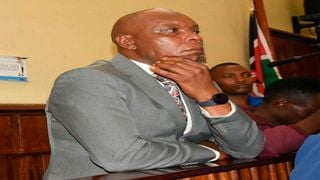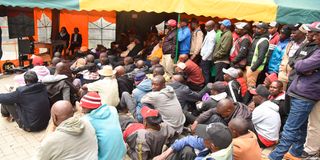
Former Mungiki leader Maina Njenga in the dock at the Nakuru law courts during the hearing of his criminal case on Wednesday.
| Bonface Mwangi | Nation Media GroupWeekly Review
Premium
The return of Maina Njenga
When he held a well-attended meeting in Kenol, Murang’a County, on October 7, former Mungiki leader Maina Njenga appeared to be making his mark within the Mt Kenya region.
Besides what was dubbed the Kikuyu Men’s Conference, Njenga has recently been on a say-nothing TV publicity drive during prime-time news and has scared the Central Kenya politicians aligned with Deputy President Rigathi Gachagua.
Njenga, 54, is a survivor—he has been shot at, kidnapped, jailed and remanded for long—and even claims to have died and resurrected. The man used to dine with former President Daniel Moi, graced Uhuru Kenyatta’s campaigns, hobnobbed with former Prime Minister Raila Odinga, and always gets a front seat at any political rally he attends.
As the Mount Kenya region goes through transition politics, Njenga has been positioning himself as an alternative force—his past notwithstanding —and has been offering some shine to the lacklustre Azimio la Umoja One Kenya Mt Kenya leaders Jeremiah Kioni and Martha Karua. More so, he seems to target the Deputy President, the most senior political figure in the region because of his current position.
As an astute mobiliser, Njenga is sending shivers within the region in what appears to be a well-organised plot to either dethrone Mr Gachagua, create power paralysis in the region, or solidify the fragmentation of the region’s politics.
Post-Ruto politics
While post-Ruto politics are now in full throttle, the Njenga positioning can only complicate Gachagua’s rise unless he commands the entire Central Kenya vote. Any division would leave him vulnerable and create space for the likes of Musalia Mudavadi, the Prime Cabinet Secretary.
This week, women MPs from the region protested Njenga’s return to the centre-stage of the region’s politics and asked Interior Cabinet Secretary Kithure Kindiki to stem Mungiki’s return. But there was more to it than the subtle fear of Mungiki.

The public follows proceedings on screens during the hearing of a case against former Mungiki leader Maina Njenga in the parking area of the Nakuru Law Courts on November 22, 2023.
That Mungiki was never vanquished has been an open secret within Mt Kenya, where it has operated with a triple identity: part traditional sect, part self-help group, and part criminal mafia. While it has dropped the symbolic dreadlocks, it has various offshoots independent of Njenga’s former extortionist gang that was sent underground by the late John Michuki, former President Mwai Kibaki’s Internal Security minister.
Like UDA, which targeted the marginalised, Njenga speaks to the same group. However, he adds revolutionary change and echoes of Mau Mau to his mobilisation strategies.
Though the group is outlawed, its ability to mobilise has always shocked the security apparatus, coupled with the ethno-nationalism that drives its agenda. At one point, it operated its tax-collection system, allocated land and controlled real estate development in the regions it operated in.
Though he has never been elected to any political position, Njenga operates best as a power broker. He is always in the company of top politicians and bodyguards, and lives like a rock star with separate homes in Laikipia, Nyahururu, Nakuru, Kajiado and Nairobi. His supporters call him “Mr Chairman”, an odd title for a man who evades questions on how he made his multi-million-shillings fortune. It is with this fortune that he bankrolls politics.
Senatorial seat
In 2017, Njenga had wanted to run for the Laikipia senatorial seat on a Jubilee Party ticket, but the party secretariat rejected his papers, citing integrity issues. Though he filed an appeal before the Political Parties Disputes Tribunal and claimed to have used Sh120 million to popularise the party, Njenga also blamed then party leader Uhuru Kenyatta and his then deputy William Ruto for his predicament. The party asked him to clear his name with the Directorate of Criminal Investigations.
“Many issues have been brought to our attention about him and as a matter of procedure, he must clear his name and satisfy us that he has nothing to do with the criminal gang,” the party’s then director for campaign communication, Albert Memusi, was quoted saying.
This week, police in Nakuru created more publicity for Njenga as they mobilised the riot squad ahead of his court appearance, where he is charged—for the nth time—for being a member of the Mungiki sect, the quasi-political gang that terrorised non-adherents and sustained itself through extortion.
The Nakuru court ordered the proceedings to be beamed on screens outside the courtroom after police attempted to block Njenga’s followers from the court precincts.
By deploying police with every appearance of Njenga in court, the police have made Njenga into an alternative symbol of power. And the man loves the altercations with police, for it throws him at the centre of attention, but more importantly, he uses them to rebuild his image as a peaceful man.
The rise of Njenga, or his promotion as an alternative leader of the Mt Kenya proletariat, has turned political as the region is caught in a political divide between Mr Kenyatta, Mr Gachagua and the search for an alternative. That search has led Ms Karua and Mr Kioni to launch what they call “Kamwene caucus”—an inward-looking community mobilisation strategy disguised as the search for an Mt Kenya kingpin.
Already, Njenga has announced that there will be a leadership handover on December 31, 2023. But Kenyatta’s supporters have thrown cold water on the announcement, fearing it could edge out the former President from the Mt Kenya politics.
In the last General Election, the Mt Kenya region made a protest vote against Mr Kenyatta and voted for President Ruto against . In essence, the voting pattern shifted the control of Mt Kenya politics, with Dr Ruto proclaiming himself the region’s kingpin.
But after the victory, Mr Gachagua started mobilising the region for political unity by shepherding the MPs elected on the Jubilee Party ticket towards Kenya Kwanza. This move led to a coup within Jubilee, in which Mr Kenyatta’s group almost lost control. The weakening of Jubilee has, ironically, created space for Njenga—just in case Mr Kenyatta leaves that void.
How Njenga will manipulate the Mt Kenya politics will depend on who is backing his bid to edge Mr Gachagua out. It also depends on whether Mr Kenyatta is interested in managing local politics, or prefers to fade into oblivion.
While appearing at the Nakuru court, Njenga’s lawyers pointed fingers at the deputy president over their client’s troubles. It was a clear indicator of his target.
Ethnic tensions
Njenga rose to fame in the 1990s by manipulating ethnic tensions, with his Mungiki group being mentioned alongside Taliban and Kamjesh gangs that were linked to the complex confrontational politics of the Nyayo era. It also represented Kikuyu nationalism—its meetings today are spiced with Mau Mau insurgency songs.
Interestingly, Njenga has dropped his traditional sect norms of “facing Mount Kenya” and in Nakuru last week, he led the crowd in a Christian prayer—a symbolic show of moderation and image building. That they no longer openly call for a return to “traditional” religious beliefs and practices does not mean that they have abandoned that past.
While Njenga has successfully crafted his image from traditionalist to “born-again” Christian, the same cannot be said of his politics.
Whatever political games are being played, Mt Kenya politics is being reconfigured. The various ethno-nationalist groupings in the area are also divided, and Njenga complicates an already complex situation.
While the disillusionment over UDA’s promises has left a bitter feeling in the region, Njenga’s past sends shivers across the terrain, and lack of another alternative leaves Mt Kenya facing political abyss.
[email protected], @johnkamau1





